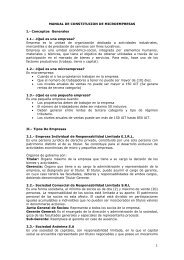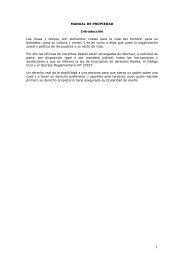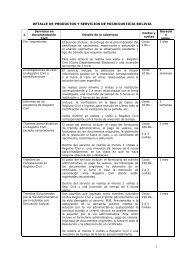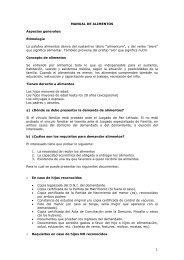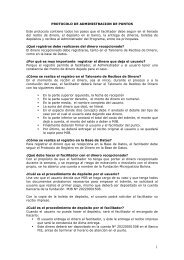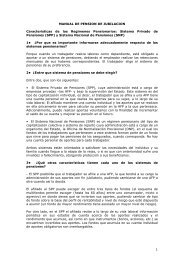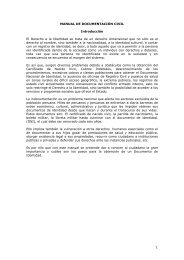ICISS report - International Coalition for the Responsibility to Protect
ICISS report - International Coalition for the Responsibility to Protect
ICISS report - International Coalition for the Responsibility to Protect
Create successful ePaper yourself
Turn your PDF publications into a flip-book with our unique Google optimized e-Paper software.
The <strong>Responsibility</strong> <strong>to</strong> <strong>Protect</strong> 74<br />
8.25 Our immediate hope is that by helping <strong>to</strong> clarify and focus <strong>the</strong> terms of <strong>the</strong> debate –<br />
not as a contest between sovereignty and intervention, but as involving “<strong>the</strong> responsibility <strong>to</strong><br />
protect” as a common <strong>the</strong>me – a way <strong>for</strong>ward will be found through <strong>the</strong> current polemics<br />
and present impasse in that debate. We want, above all, <strong>to</strong> streng<strong>the</strong>n <strong>the</strong> prospects <strong>for</strong><br />
obtaining action, on a collective and principled basis, with a minimum of double standards,<br />
in response <strong>to</strong> conscience-shocking situations of great humanitarian need crying out <strong>for</strong> that<br />
action. If our <strong>report</strong> can help <strong>to</strong> stimulate support <strong>for</strong> such action by reminding states of <strong>the</strong>ir<br />
common responsibilities, <strong>the</strong>n it will have made a very significant contribution indeed.<br />
8.26 The principles of action around which we would like <strong>to</strong> see consensus develop are<br />
summarized in <strong>the</strong> Synopsis set out in <strong>the</strong> first pages of this <strong>report</strong>. What should happen next<br />
<strong>to</strong> advance <strong>the</strong>m? There has been much discussion, at national, regional and international<br />
levels, on how best <strong>to</strong> approach <strong>the</strong> practical task of trying <strong>to</strong> embody any new consensus<br />
among states on <strong>the</strong> question of intervention <strong>for</strong> human protection purposes. Some suggest<br />
that <strong>the</strong> focus should be on drafting guidelines <strong>for</strong> <strong>the</strong> internal use of <strong>the</strong> Security Council;<br />
some support <strong>the</strong> passing of a more <strong>for</strong>mal resolution by <strong>the</strong> General Assembly; and o<strong>the</strong>rs<br />
have gone so far as <strong>to</strong> suggest that work should begin on <strong>the</strong> drafting of a new international<br />
convention, or even an amendment <strong>to</strong> <strong>the</strong> UN Charter itself.<br />
8.27 The Commission believes that it would be premature <strong>to</strong> make a judgement now as<br />
<strong>to</strong> what will ultimately prove possible if consensus around <strong>the</strong> idea of “<strong>the</strong> responsibility <strong>to</strong><br />
protect” builds <strong>to</strong> <strong>the</strong> extent that we hope it will. The important thing now is <strong>to</strong> make a start,<br />
with member states working with <strong>the</strong> Secretary-General <strong>to</strong> give substantive and procedural<br />
content <strong>to</strong> <strong>the</strong> ideas we advance. There are major roles <strong>to</strong> be played by <strong>the</strong> Secretary-General<br />
himself, by <strong>the</strong> Security Council and by <strong>the</strong> General Assembly, and we make some suggestions<br />
in this respect in <strong>the</strong> following recommendations. The Commission makes no<br />
judgement as <strong>to</strong> <strong>the</strong> most appropriate sequence in which <strong>the</strong>se steps should be taken.<br />
8.28 The Commission recommends <strong>to</strong> <strong>the</strong> General Assembly:<br />
That <strong>the</strong> General Assembly adopt a draft declara<strong>to</strong>ry resolution embodying <strong>the</strong><br />
basic principles of <strong>the</strong> responsibility <strong>to</strong> protect, and containing four basic elements:<br />
❏ an affirmation of <strong>the</strong> idea of sovereignty as responsibility;<br />
❏ an assertion of <strong>the</strong> threefold responsibility of <strong>the</strong> international community of states – <strong>to</strong><br />
prevent, <strong>to</strong> react and <strong>to</strong> rebuild – when faced with human protection claims in states<br />
that are ei<strong>the</strong>r unable or unwilling <strong>to</strong> discharge <strong>the</strong>ir responsibility <strong>to</strong> protect;<br />
❏ a definition of <strong>the</strong> threshold (large scale loss of life or ethnic cleansing, actual or<br />
apprehended) which human protection claims must meet if <strong>the</strong>y are <strong>to</strong> justify military<br />
intervention; and<br />
❏ an articulation of <strong>the</strong> precautionary principles (right intention, last resort, proportional<br />
means and reasonable prospects) that must be observed when military <strong>for</strong>ce is used<br />
<strong>for</strong> human protection purposes.<br />
8.29 The Commission recommends <strong>to</strong> <strong>the</strong> Security Council:<br />
(1) That <strong>the</strong> members of <strong>the</strong> Security Council should consider and seek <strong>to</strong> reach agreement<br />
on a set of guidelines, embracing <strong>the</strong> “Principles <strong>for</strong> Military Intervention” summarized<br />
in <strong>the</strong> Synopsis, <strong>to</strong> govern <strong>the</strong>ir responses <strong>to</strong> claims <strong>for</strong> military intervention <strong>for</strong> human<br />
protection purposes.



